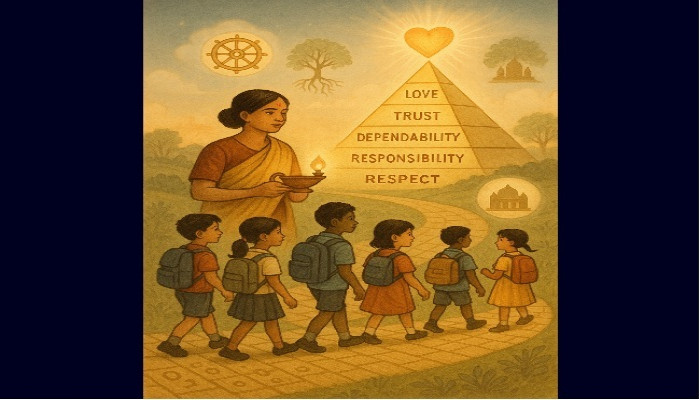Education, Dharma, and the Shaping of Souls: From Information to Wisdom
- In Society
- 06:40 PM, Jul 22, 2025
- Dr Ryan Baidya
The True Purpose of Education
In a world overwhelmed by data and rapid technological change, education has often been reduced to a means of economic advancement. Yet, the original and enduring purpose of education transcends job preparation or skill acquisition. At its heart, education is a sacred journey of the human soul—a process that nurtures awareness, sharpens the intellect, and refines character. Its mission is not simply to create capable workers, but to cultivate wise, responsible, and morally grounded individuals who can live meaningfully and serve society with integrity.
Ancient traditions, especially in India, regarded education as a deeply personal and transformative process. It was a quest to become an adhyatmic purusha—a complete human being—who understood their place in the world, upheld their dharma (natural duty), and acted with compassion and foresight. This understanding must guide us now, more than ever.
Dharma and the Soul’s Role in Learning
Dharma is more than a moral code—it is the intrinsic order of the universe and the individual’s rightful conduct within it. For a student, dharma means the relentless pursuit of truth, the humility to learn, and the selfless commitment to the betterment of society. It involves cultivating inner clarity, honouring one’s teachers and elders, and developing qualities such as discipline, gratitude, honesty, and empathy.
This dharmic orientation transforms education from a transactional exchange into a sacred relationship between teacher and student, knowledge and wisdom, self and society. It aligns personal growth with collective well-being.
From Information to Wisdom: A Transformative Journey
Education should guide learners through a hierarchy of intellectual and moral growth:
- Information – the raw facts, like scattered bricks.
- Knowledge – organised, contextual information; the blueprint.
- Intelligence – the ability to apply knowledge effectively and adaptively; the skill of building.
- Wisdom – the capacity to use knowledge and experience with empathy, foresight, and moral clarity; the completed, purposeful structure.
The wise are not merely informed or intelligent—they are those who have lived, failed, reflected, and grown. Wisdom integrates intellect with compassion, skill with ethics, and decision-making with conscience. It is the true aim of education.
Building the Pyramid of Character
True education is character-building. It constructs the self like a sacred pyramid, layer by layer:
- At the base lies truthfulness, the foundation of authenticity.
- Respect rises from it, honouring others and the learning process.
- Responsibility follows, where action aligns with integrity.
- Dependability is next, as consistent character earns trust.
- At the summit, love shines—selfless, transformative, and unifying.
This pyramid reflects the path from external learning to internal becoming. It also defines the type of citizens a just and conscious society must foster.
The Dharma of the Present Moment
Too often, we treat education as preparation for a distant future. But the truth is, the future begins now. Students must be taught that every present moment contains within it the seed of tomorrow. What we do today—how we learn, how we act, what we value—shapes not just our personal destiny but that of our communities and nations.
Like a potter shaping clay, the present moulds the future. If we neglect soul-building in favour of skill-building alone, we risk producing efficient individuals without empathy, and informed minds without integrity. A society led by such people invites decay.
Roots and Resilience
A crucial component of holistic education is reconnecting students with their roots—family stories, cultural memory, national heritage, and spiritual lineage. When young people lose touch with these roots, they risk losing identity, direction, and inner strength. But when rooted in truth and tradition, they grow resilient, productive, and visionary.
Understanding one’s history is not about nostalgia—it is about identity and continuity. A rootless tree may appear green, but it will fall in the first storm. A rooted soul, however, can weather any age.
Conclusion: Leading from Darkness to Light
Education is not merely a ladder to climb the socioeconomic hierarchy—it is the light that dispels the darkness of ignorance. It is the vehicle that carries the individual from confusion to clarity, from selfishness to service, from mere knowledge to wise living.
A truly educated person is not one who knows the most, but one who becomes the most—most aware, most responsible, and most compassionate. They embody their dharma not out of fear or reward, but from a place of inner understanding and love.
To educate is to elevate. And to elevate is to build souls.







Comments